Overview
Navigating the world of disability benefits in Florida can feel overwhelming. We understand that many face challenges when seeking the support they need. This article outlines nine key requirements for disability benefits, including:
- Eligibility criteria
- Necessary documentation
- The application process
It's crucial to prepare thoroughly and seek support from advocates. Claimants who have representation often experience significantly higher approval rates than those who apply independently. This support can make a world of difference in your journey.
Remember, you are not alone in this process. We’re here to help you understand each step and ensure you have the resources you need. By taking the time to gather the right information and support, you can increase your chances of success.
If you have questions or need assistance, don’t hesitate to reach out. Together, we can navigate this complex system and work towards securing the benefits you deserve.
Introduction
Navigating the complex landscape of disability requirements in Florida can feel overwhelming. We understand that as regulations change and the demand for assistance grows, it’s common to feel lost. Knowing the specific criteria for Social Security Disability benefits is essential for anyone seeking support. Unfortunately, approval rates can be discouragingly low without the right guidance.
So, what steps can you take to improve your chances of success in this intricate process? How can you ensure that you meet the necessary documentation and eligibility standards? This article explores the key requirements and strategies for securing disability benefits in Florida. We’re here to help you find the essential insights you need on this journey.
Turnout: Streamline Your Disability Application Process in Florida
Navigating the disability in Florida requirements during the benefits application process can feel overwhelming. At Turnout, we understand that seeking assistance with Social Security Disability (SSD) claims can be daunting. That’s why we’re here to help. By harnessing the power of AI technology and expert guidance, we’re transforming this landscape to make it more accessible and less intimidating for you.
Our innovative approach simplifies the application process, allowing you to focus on what truly matters—your health. With features like automated document management and proactive follow-ups, you can rest assured that Turnout is navigating the complex bureaucratic landscape on your behalf. This streamlined process not only reduces the time needed to finalize applications but also significantly boosts your chances of approval.
Research shows that represented claimants achieve approval rates up to 30% higher than those without representation. This highlights the importance of having Turnout by your side. Our trained non-legal advocates work tirelessly to ensure you receive the benefits you deserve, without unnecessary delays.
We know that technology can sometimes feel intimidating, but at Turnout, we’re committed to using it to help you overcome systemic obstacles. We’re here to support you every step of the way, addressing any concerns about AI misinterpretation in claims. Remember, you are not alone in this journey. Let us help you access the essential services you need.
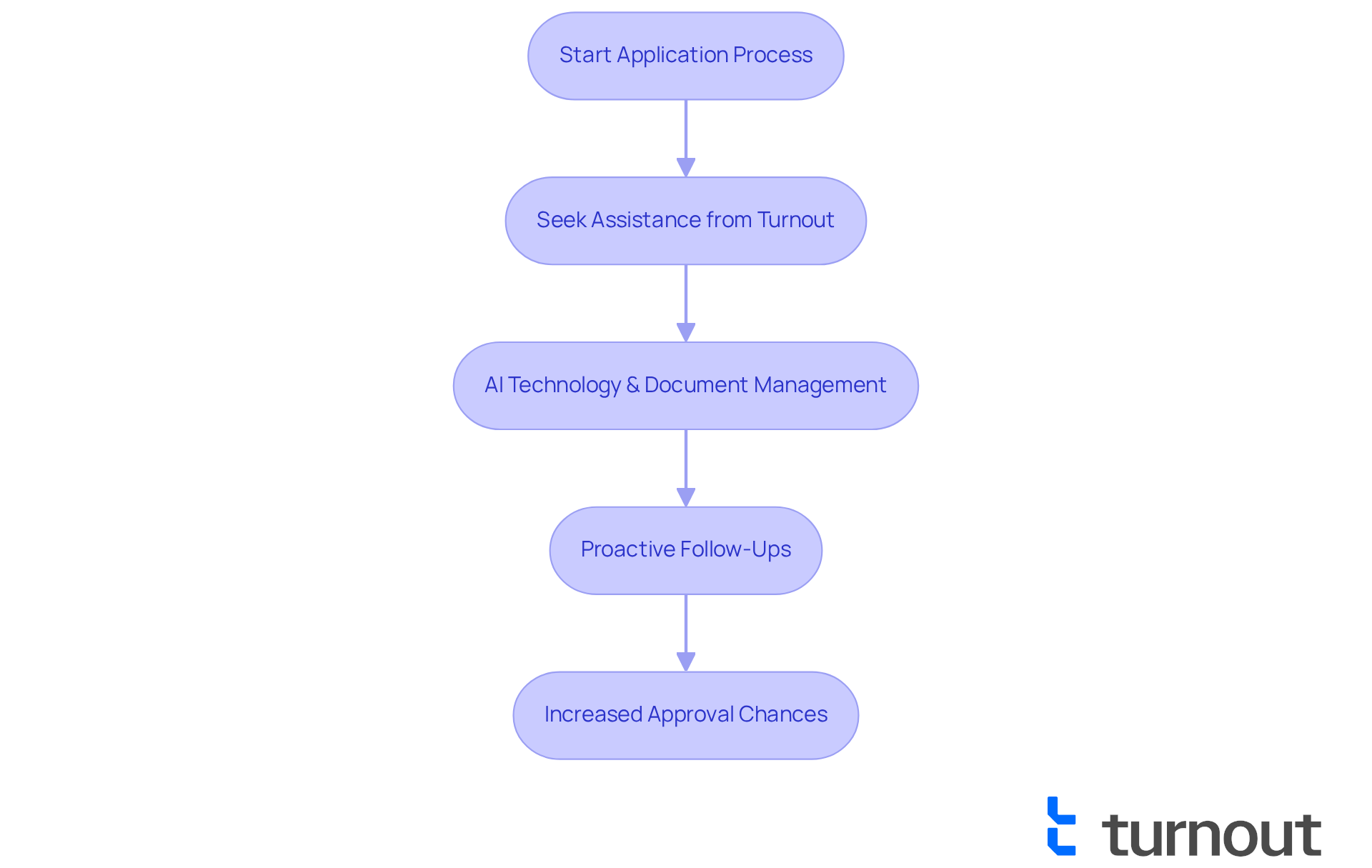
Eligibility Criteria: Key Requirements for Disability Benefits in Florida
Navigating the process of qualifying for disability in Florida requirements can feel overwhelming, but you’re not alone in this journey. To qualify, individuals must meet specific criteria set by the Social Security Administration (SSA). This means you need to have worked in jobs covered by Social Security and have a medical condition that significantly limits your ability to work for at least 12 consecutive months.
In 2025, most candidates will need a total of 40 work credits, with at least 20 of those earned in the last 10 years before your disability began. If you’re younger, you might qualify with fewer credits based on your age at the time of your disability. It’s also crucial to ensure that your earnings don’t exceed the Substantial Gainful Activity (SGA) limit, which is $1,620 per month for non-blind individuals and $2,700 for those who are blind.
Understanding the disability in Florida requirements is crucial for determining your eligibility and crafting a successful application. Did you know that in Florida, the average approval rate for initial Social Security Disability applications is around 30-35%? This highlights how important it is to provide thorough documentation and follow the SSA's guidelines closely.
Real-world examples show that individuals who submit detailed medical documentation and clearly explain how their condition affects their work abilities significantly improve their chances of approval. We understand that this process can be daunting, which is why Turnout offers support through trained non-professional advocates. They can help you navigate the SSD application process, ensuring you understand the disability in Florida requirements and boosting your chances of success.
It’s important to remember that Turnout is not a law firm and does not provide legal advice. If your application is denied, you have the right to appeal. This includes several stages, such as reconsideration and hearings, giving you a pathway to potentially overturn the decision. Remember, you are not alone in this journey, and we’re here to help.
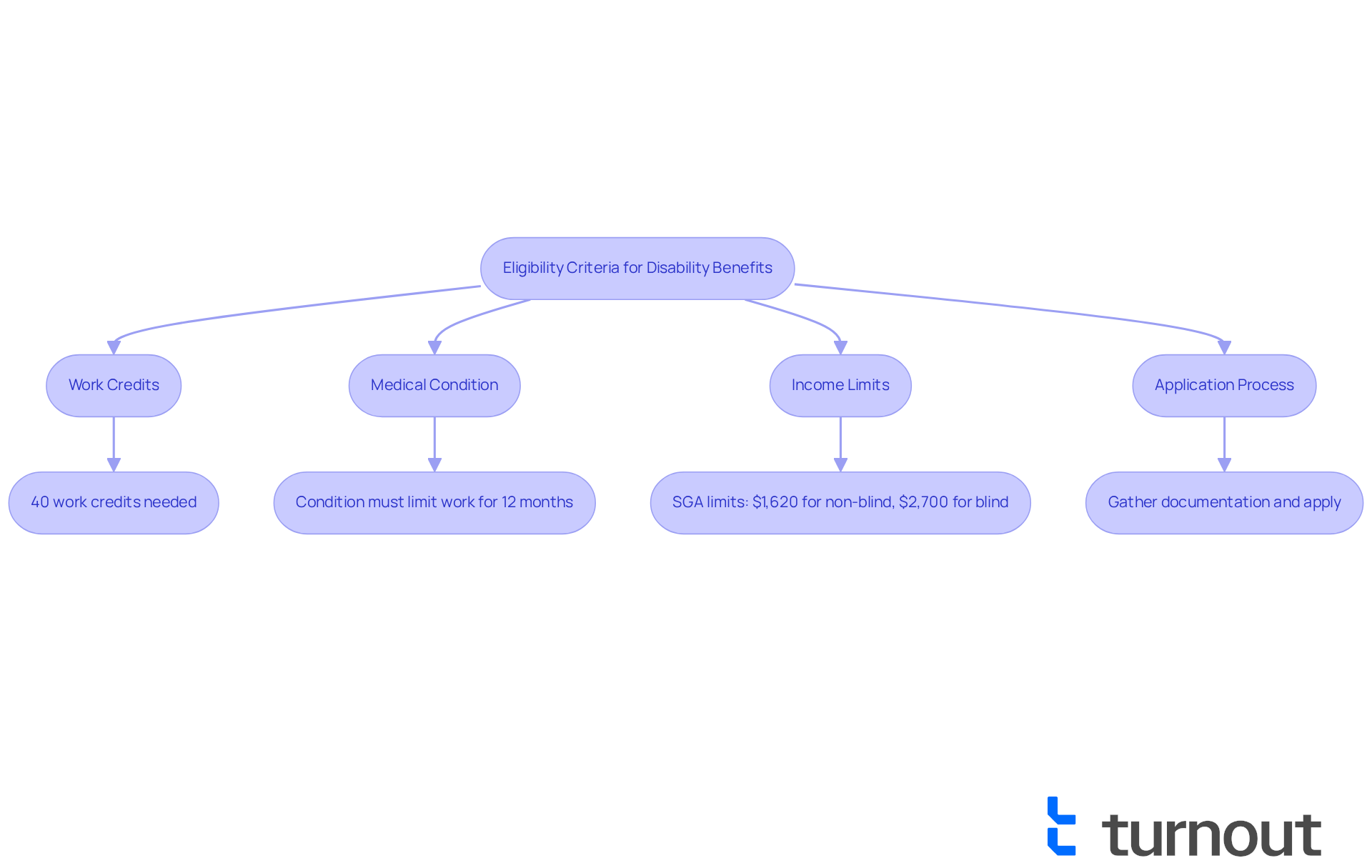
Documentation Essentials: What You Need to Apply for Disability in Florida
When seeking benefits, understanding the disability in Florida requirements can help alleviate the overwhelming nature of the process. Collecting thorough documentation is essential to bolster your request. Here are some key documents you’ll need:
- Medical Records: Detailed accounts of your condition and treatment history are vital. They provide a clear picture of your health journey.
- Proof of Income and Work History: This can include W-2 forms or recent pay stubs to demonstrate your employment background. It’s important to show how your condition has impacted your ability to work.
- Identification Documents: A certified copy of your birth certificate and Social Security card are necessary for verification. These documents help establish your identity.
- Test Results and Evaluations: Relevant medical test results or evaluations from healthcare providers can strengthen your application. They offer concrete evidence of your condition.
Having these documents prepared can significantly streamline the application process and help prevent delays. Did you know that nearly two-thirds of disability applications are denied, often due to insufficient documentation? It is crucial for a successful request to ensure that all necessary documents are in order to meet disability in Florida requirements.
For instance, a client named Pamela W. benefited from thorough documentation, which helped her navigate discrepancies in her insurance claims effectively. By being proactive and organized, you can improve your chances of approval and obtain the advantages you deserve. Remember, you are not alone in this journey; we’re here to help you every step of the way.
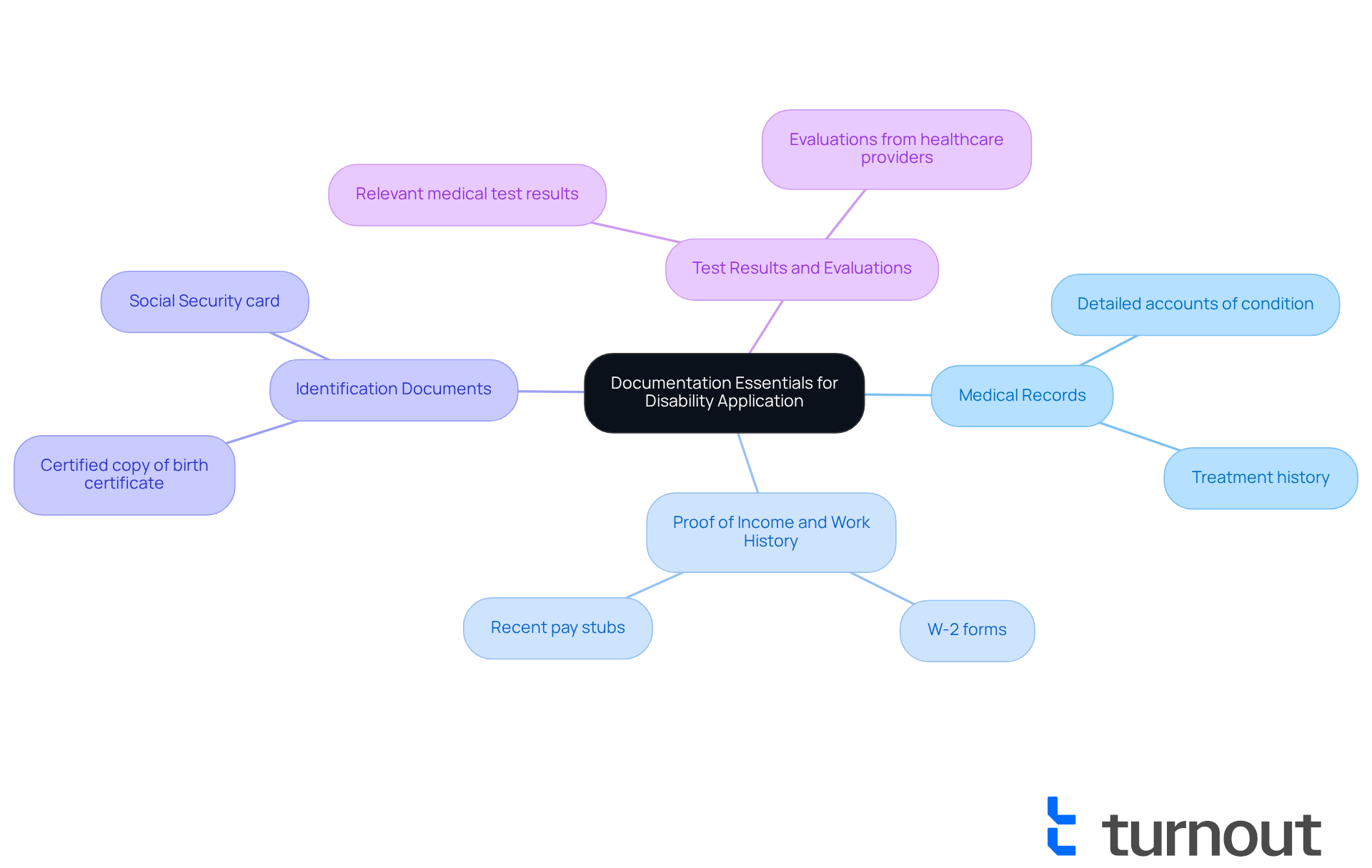
Types of Disability Programs: Exploring Options in Florida
In Florida, we understand that navigating the disability in Florida requirements can be overwhelming. If you or someone you know is in need, there are two key options available that can provide crucial support:
-
Social Security Disability Insurance (SSDI): This program is designed for individuals who have a work history and have contributed to Social Security. To be eligible, you need sufficient work credits earned through employment. As of January 2025, the average monthly benefit for SSDI recipients is around $1,352.32, with a maximum benefit reaching $4,018 based on your work history. At Turnout, we offer assistance with SSD claims through trained nonlawyer advocates, guiding you through the complexities of the application process without the need for legal representation.
-
Supplemental Security Income (SSI): Unlike SSDI, SSI is a needs-based program aimed at individuals with limited income and resources, regardless of their work history. The average monthly assistance for SSI recipients is approximately $967.
Understanding the differences between SSDI and SSI is essential for determining which benefits you may qualify for under the disability in Florida requirements. While SSDI is based on prior work contributions, SSI provides vital support for those who may not have had the chance to build a work history. It’s also important to note that some individuals may qualify for both SSI and SSDI if they meet the necessary criteria, offering a more substantial safety net.
Moreover, once you obtain SSDI, you automatically become eligible for Medicare after a 24-month waiting period from when your assistance begins. This dual structure is designed to ensure that individuals with disabilities receive the tailored assistance they need. At Turnout, we also provide tax debt relief services, further supporting you in navigating financial challenges.
Remember, you are not alone in this journey. We’re here to help you find the support you need.
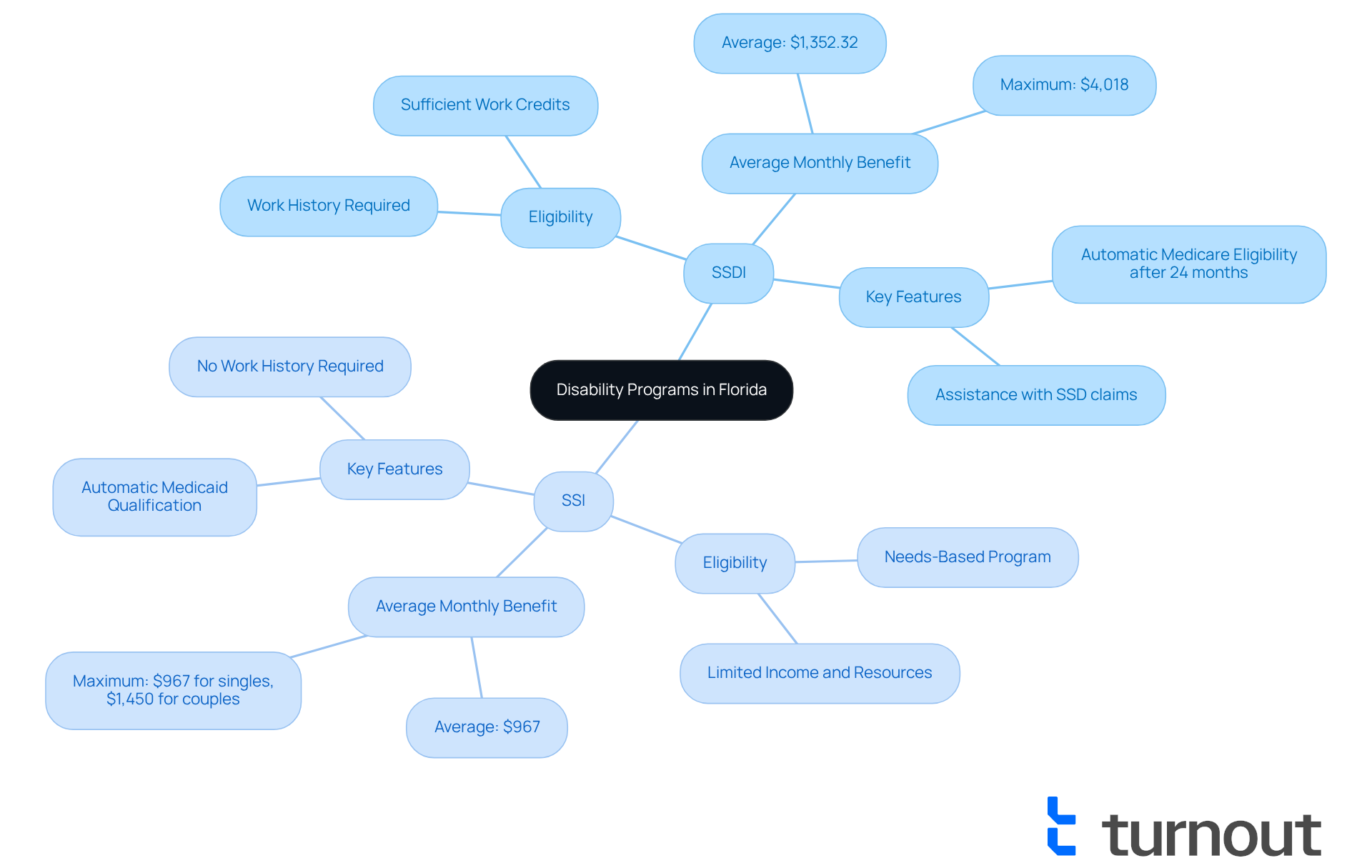
Qualifying Medical Conditions: What Counts for Disability in Florida
If you're seeking assistance, understanding the disability in Florida requirements is essential, as you must have a medical condition that aligns with the Social Security Administration's (SSA) definition of disability. We understand that navigating this process can be overwhelming, so let’s break down some common qualifying conditions:
- Musculoskeletal disorders: Conditions like arthritis and back injuries are quite common, making up over 34% of SSDI approvals in recent years.
- Neurological disorders: Serious conditions such as multiple sclerosis and epilepsy can significantly affect daily life.
- Cardiovascular conditions: Heart disease and related disorders are frequently seen among applicants, representing a substantial portion of disability requests.
- Mental health disorders: Issues like depression and anxiety are increasingly recognized, with mental health conditions accounting for about 12% of disabled adult workers.
- Cancer and other severe illnesses: Malignant neoplasms, including breast and lung cancer, are critical conditions that qualify for assistance.
Providing thorough medical records is crucial for your request to meet the disability in Florida requirements. We know that substantial evidence can greatly enhance your chances of approval. For example, sticking to treatment recommendations and keeping open communication with your healthcare providers can strengthen your case for SSDI benefits, showing your commitment to managing your health.
It's important to remember that Turnout is not a law firm and does not offer legal advice. However, we’re here to help you understand the disability in Florida requirements! Turnout provides assistance through trained nonlawyer advocates who can guide you through the SSD claims process, ensuring you have the support you need to present your case effectively.
Additionally, the Compassionate Allowances initiative can speed up the decision-making process for individuals with clear medical evidence, further assisting you in navigating the system. You are not alone in this journey; we’re here to support you every step of the way.
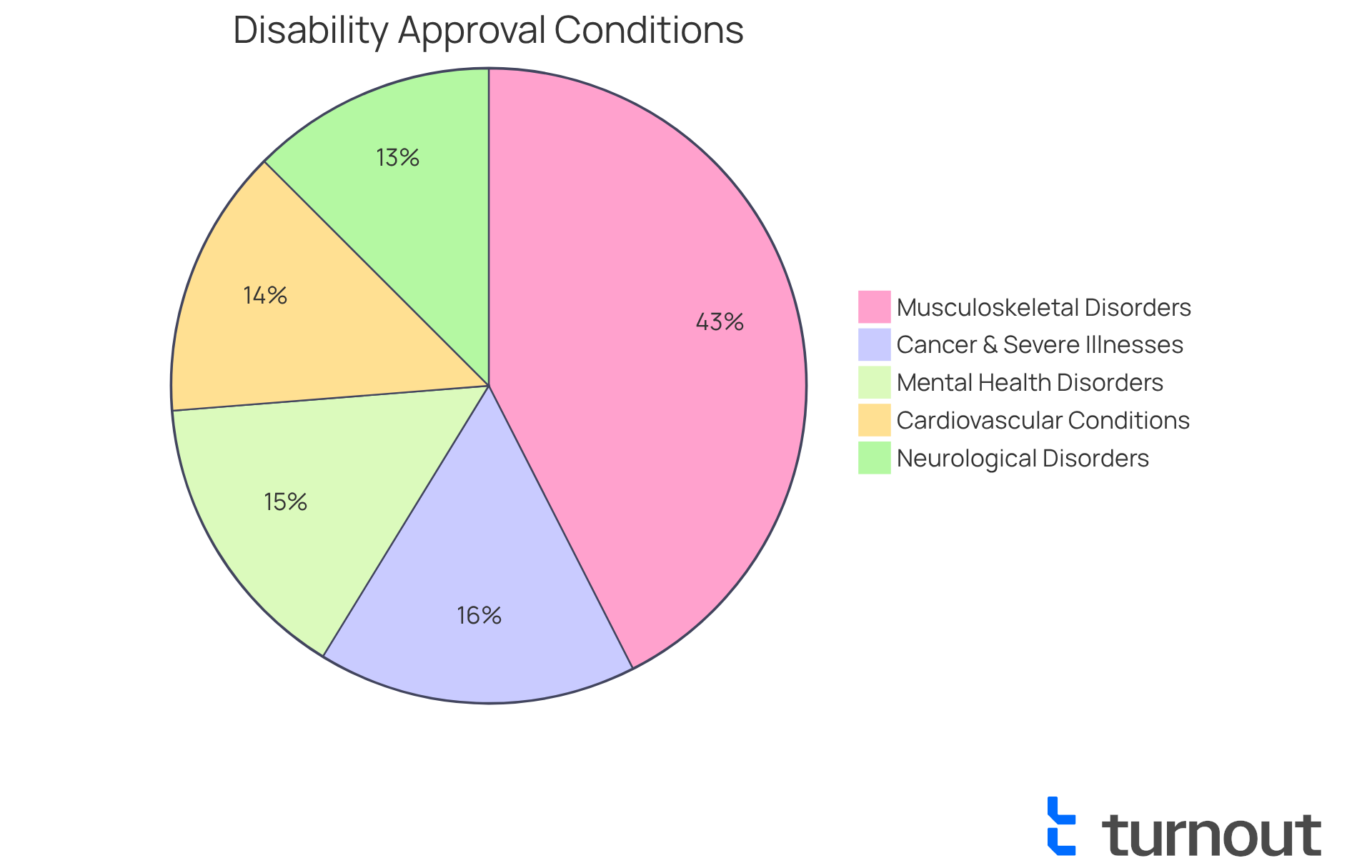
Application Process: Steps to Apply for Disability Benefits in Florida
Applying for disability in Florida requirements can feel overwhelming, but you’re not alone in this journey. Here are some key steps to help guide you through the process:
-
Determine eligibility by first assessing whether you meet the disability in Florida requirements for Social Security Disability Insurance (SSDI) or Supplemental Security Income (SSI). Understanding your options is crucial.
-
Gather Documentation: Next, collect all necessary medical and financial documents. Thorough documentation is vital for a successful application, so take your time to ensure everything is in order.
-
Consult with Advocates: We understand that navigating this process can be challenging. That’s why it’s strongly advised to consult with experienced advocates, like those at Turnout. They can provide tailored advice and enhance your chances of a successful application. Turnout employs trained nonlegal advocates who are ready to assist with SSD requests.
-
Complete the Application: Once you have your documents ready, fill out the application form. You can submit it online through the Social Security Administration (SSA) portal, by phone at 1-800-772-1213, or in person at a local SSA office.
-
Submit Your Application: Before you submit, double-check that all documents are included. It’s important to ensure everything is complete to avoid any delays in processing.
-
Follow Up: After submission, regularly check the status of your application. Respond promptly to any requests for additional information. Staying proactive can significantly improve your chances of approval.
Certain medical conditions may qualify for expedited review under SSA guidelines, leading to faster processing times. Additionally, in Florida, you can submit concurrent claims for SSDI based on work history and SSI based on financial need, as long as you meet the disability in Florida requirements.
Data shows that individuals who seek representation often achieve approval rates up to 30% higher than those who go it alone. In Florida, the approval rate for initial SSD applications is around 38%, which is below the national average of 42%. Understanding these dynamics can empower you to navigate the system more effectively. Remember, we’re here to help you every step of the way.
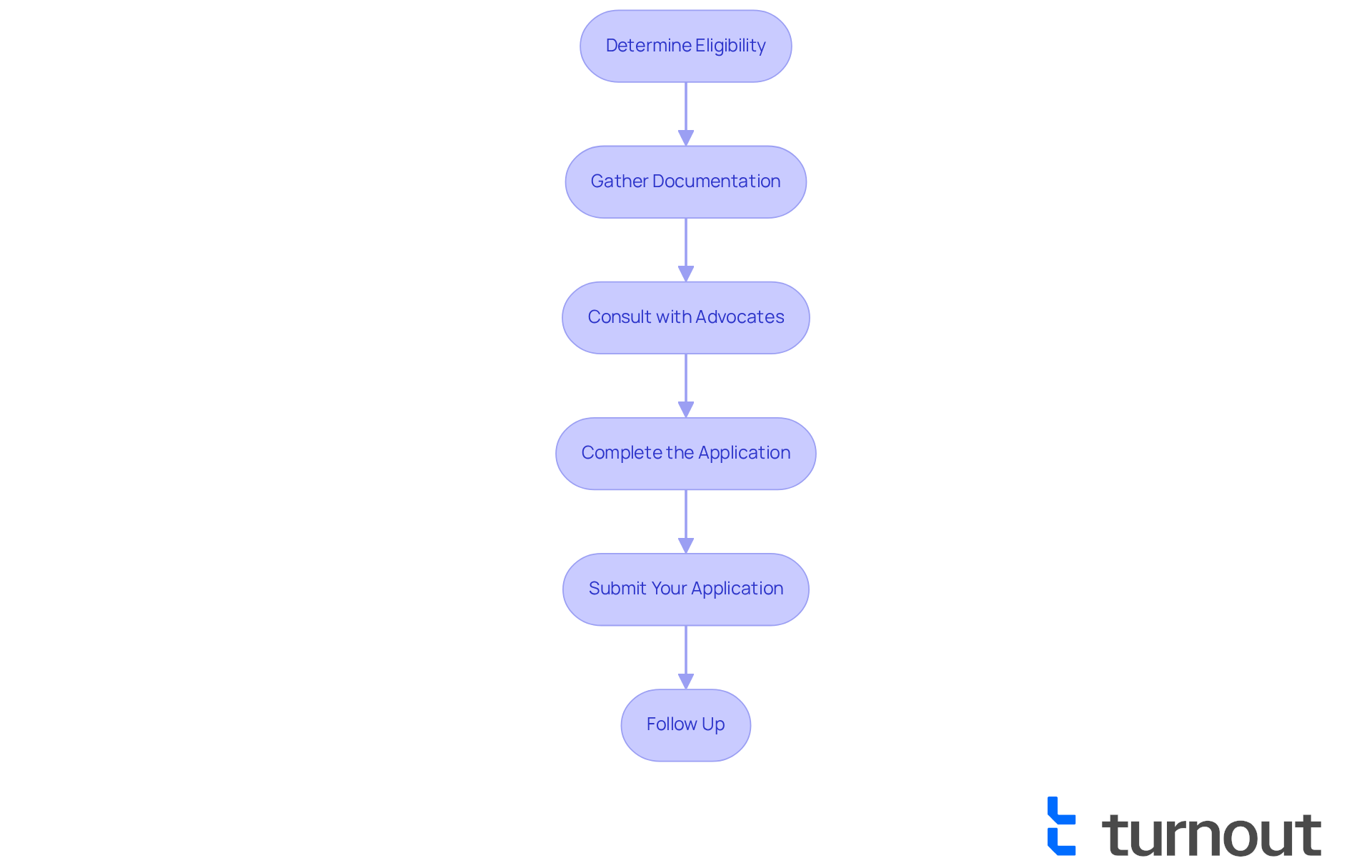
Timeline Expectations: How Long to Wait for Disability Benefits in Florida
Navigating the timeline for meeting disability in Florida requirements can be challenging, and it’s completely normal to feel overwhelmed. We understand that those seeking assistance should be prepared for potential delays. Here’s a general overview of what to expect:
- Initial Application Review: 3 to 5 months.
- Reconsideration (if denied): An additional 3 to 5 months.
- Hearing (if further denied): 12 to 24 months.
Patience and proactivity are key during this process, as delays are common. In fact, the average wait time for initial decisions has risen to about 225 days, reflecting a broader trend of extended processing times. Many candidates experience frustration due to the complexities of the system, especially considering that around 62% of initial SSDI submissions are rejected nationwide.
Turnout is here to simplify access to government benefits by offering expert guidance through this often daunting process. It’s important to note that Turnout is not a law firm and does not provide legal representation. However, research shows that candidates who have representation achieve approval rates that are up to 30% higher than those who go it alone. This underscores the importance of thorough preparation and understanding the disability in Florida requirements for documentation. Many applications are denied due to insufficient medical evidence or not meeting the Social Security Administration's strict criteria.
By employing trained non-professional advocates and utilizing specific resources designed to assist applicants, Turnout helps individuals navigate the SSD application process more efficiently. We’re here to ensure you remain informed and involved, which can significantly enhance your chances of a favorable outcome. Remember, you are not alone in this journey.
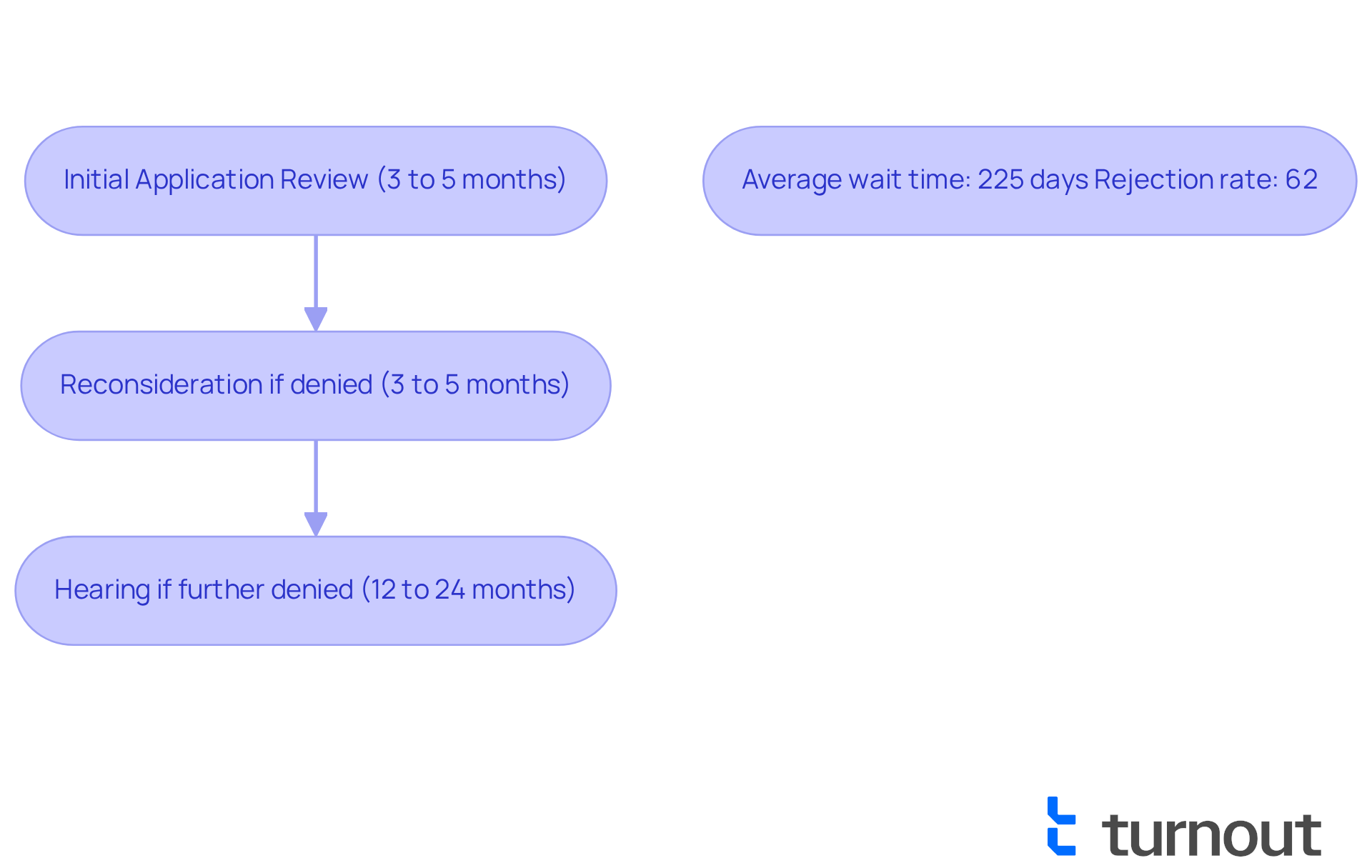
Appeals Process: What to Do If Your Disability Claim Is Denied
If your request regarding disability in Florida requirements is denied, we understand how disheartening that can be. But remember, you have the right to contest the decision. The appeals process consists of several important steps that can help you navigate this challenging journey:
-
Request for Reconsideration: You have 60 days to file this request, which will be reviewed by a different SSA representative. It’s worth noting that approximately 15% of requests for disability in Florida requirements are approved. So, be sure to submit any new medical evidence or documentation that supports your case.
-
Hearing Request: If the reconsideration is denied, you can request a hearing before an Administrative Law Judge (ALJ). This stage is crucial. In fact, over 50% of individuals who appeal at this level receive benefits. Prepare to present comprehensive evidence, including witness testimony and updated medical reports, to fulfill the disability in Florida requirements.
-
Appeals Council: If the ALJ rejects your request, you can appeal to the Appeals Council. This review is conducted by senior officials within the SSA, who will assess the ALJ's decision for compliance with SSA rules.
-
Federal Court: As a last resort, you can take your case to federal court if the Appeals Council's decision is unsatisfactory. This option allows for a legal review of the case, but it can be a lengthy process.
Each step in the appeals process requires careful preparation and thorough documentation to strengthen your case. We know persistence is essential, as many outcomes are ultimately determined at the hearing stage. It’s crucial to approach each level of appeal with care and confidence. Remember, you are not alone in this journey; we’re here to help.
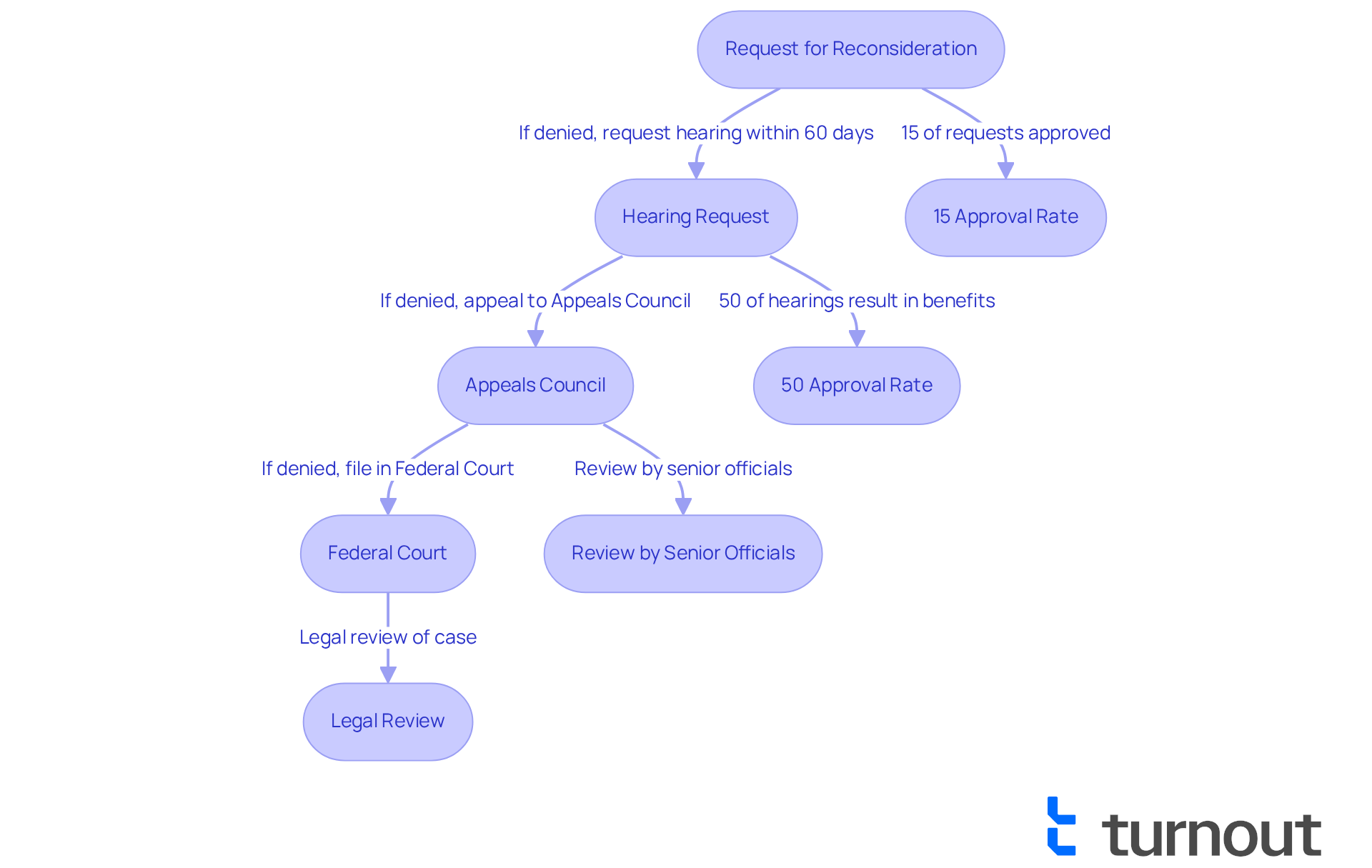
Legal Assistance: When to Consult a Disability Advocate in Florida
Seeking assistance from a disability advocate can significantly enhance your ability to navigate the application process for support. We understand that this journey can feel overwhelming, and there are key situations where reaching out for help is especially beneficial:
- If you’re unsure about your eligibility or the steps involved in the application process.
- If your initial claim has been denied and you need support with the appeals process.
- If you have a complex medical condition that requires thorough documentation.
- If the extensive paperwork and looming deadlines are making you feel stressed.
Turnout connects you with trained nonlawyer advocates who provide personalized guidance tailored to your unique circumstances. They can help you maneuver through the complexities of the system more effectively. In 2025, many individuals reported positive outcomes after involving advocates, highlighting their essential role in obtaining benefits. For instance, over 20,000 people are currently on the service waitlist in Florida, underscoring the significant need for assistance. Numerous stories illustrate how Turnout's supporters have helped individuals overcome initial denials, leading to successful appeals and access to necessary support.
The demand for help with disability in Florida requirements is substantial, as thousands of Floridians are actively seeking assistance. Advocates not only offer clarity and direction but also empower individuals to stand up for their rights, ensuring they receive the benefits they deserve. Moreover, the ongoing government shutdown may complicate access to assistance, making the role of advocates even more crucial during this time. Remember, Turnout is not a law firm and does not provide legal advice, but we’re here to help you every step of the way. You are not alone in this journey.
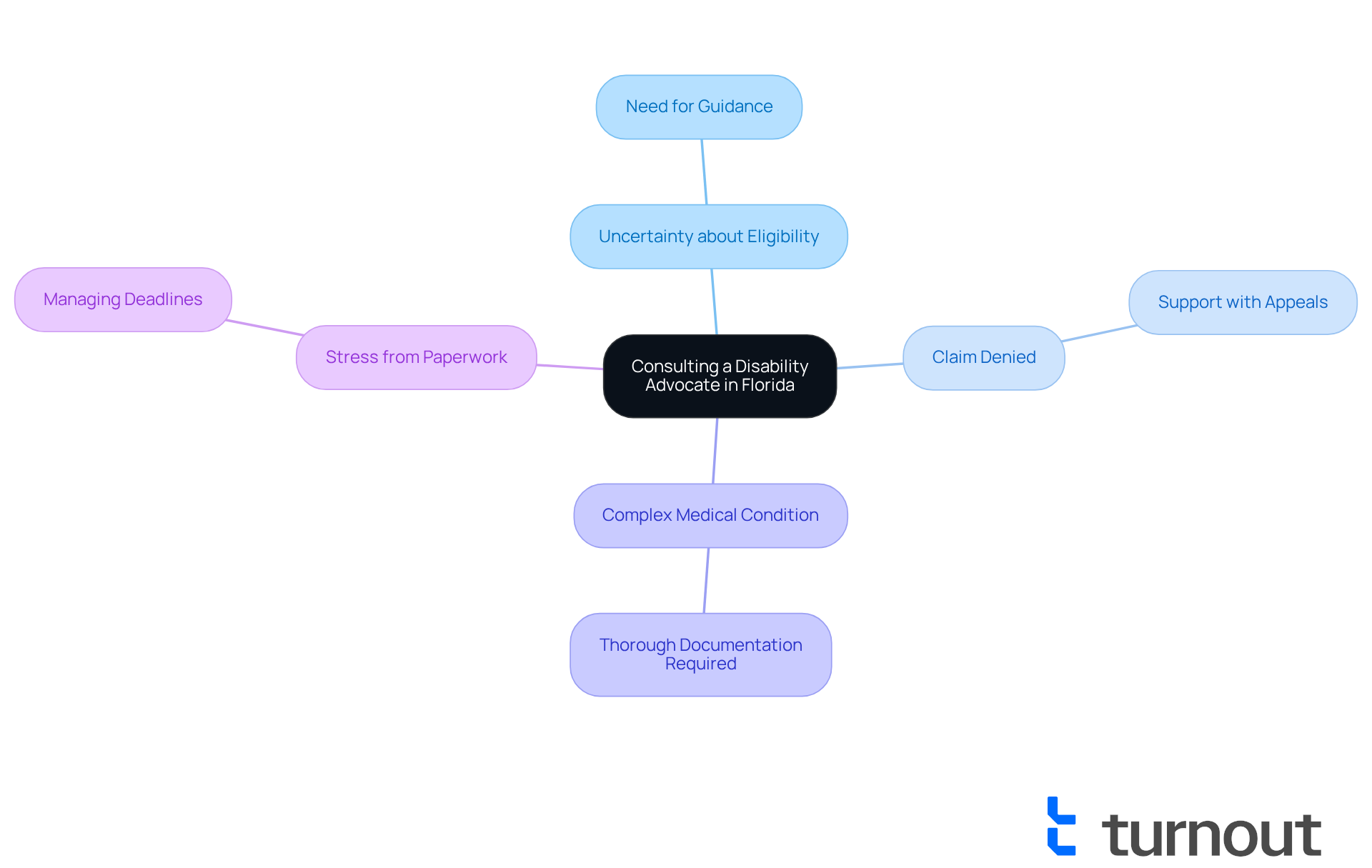
Stay Informed: Keeping Up with Disability Laws and Benefits in Florida
Staying informed about the disability in Florida requirements and advantages is crucial for applicants. We understand that navigating this landscape can be overwhelming, but there are key resources available to help you.
- Social Security Administration (SSA) Website: Regularly check for updates on eligibility criteria and benefits. Changes can significantly impact your access to support, so staying informed is essential.
- Disability Rights Florida: Follow their updates on advocacy efforts and legislative changes that affect people with disabilities. This ensures you are aware of your rights and the resources available to you.
- Local Advocacy Groups: Engage with local organizations that provide resources and support for individuals with disabilities. These groups often have firsthand knowledge of the latest developments and can offer guidance tailored to your specific needs.
Additionally, Turnout offers a range of tools and services designed to simplify access to government benefits, including assistance with Social Security Disability (SSD) claims. By utilizing trained nonlawyer advocates, Turnout helps applicants navigate the complexities of the SSD process without the need for legal representation. This assistance is essential, especially considering that recent statistics show the statewide waitlist surpasses 20,000 people for meeting disability in Florida requirements. The urgency of remaining informed cannot be overstated.
Advocacy groups play a vital role in raising public awareness about these issues. They ensure that the voices of individuals with disabilities are heard and considered in legislative discussions. Remember, you are not alone in this journey. We're here to help you every step of the way.
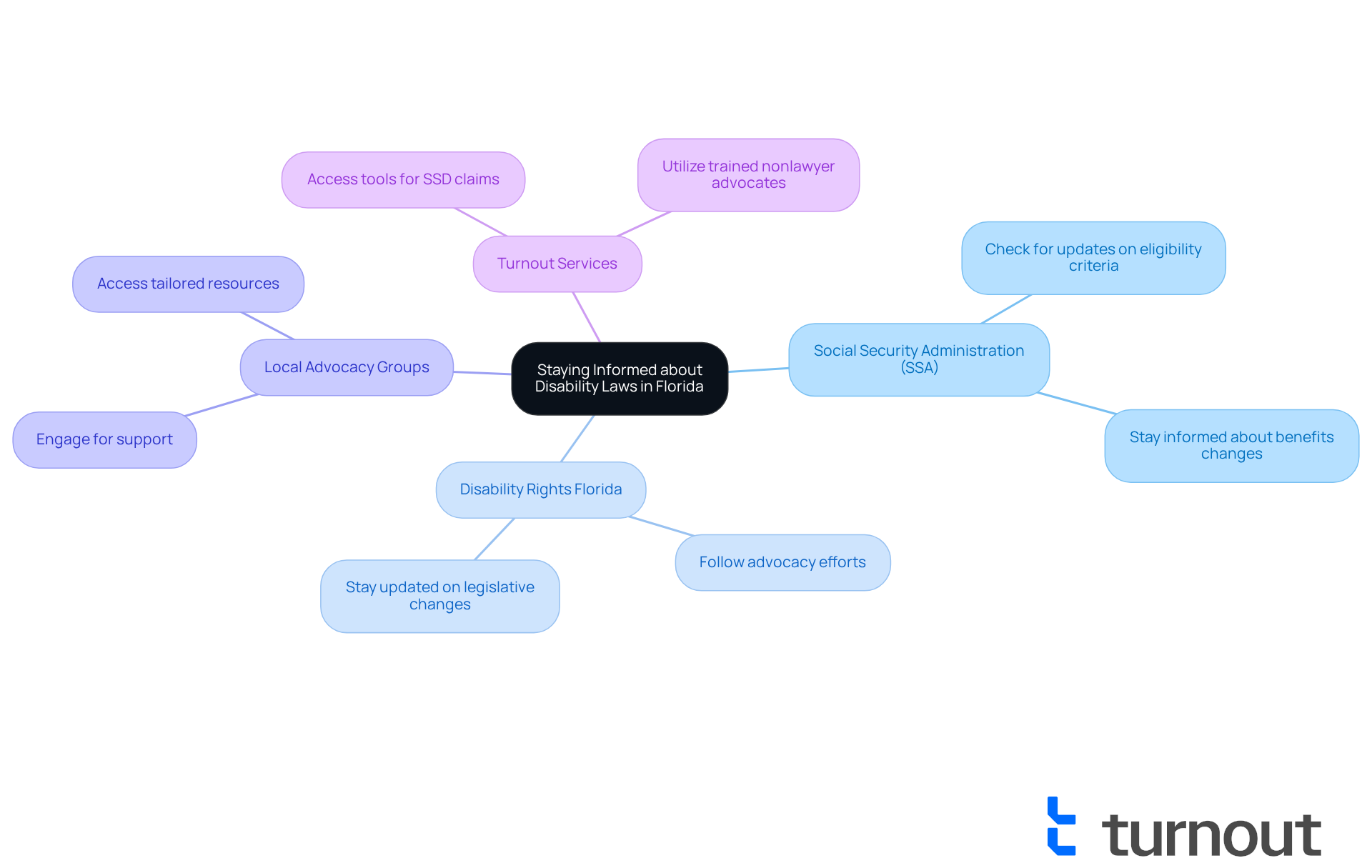
Conclusion
Navigating the landscape of disability in Florida can feel overwhelming. We understand that the requirements and processes may seem complex, but knowing what to expect is essential for securing the benefits you need. This article has highlighted key aspects of the disability application process, including:
- Eligibility criteria
- Necessary documentation
- Types of programs available
- Steps involved in filing a claim
By familiarizing yourself with these points, you can better prepare to face the challenges of obtaining disability benefits.
Thorough documentation is crucial, and understanding the difference between SSDI and SSI programs can make a significant impact. It’s also important to recognize the role of advocates in improving approval rates. Research shows that represented claimants often have a much higher chance of success. Seeking assistance, especially from organizations like Turnout, can truly make a difference in navigating this intricate system. Additionally, knowing the appeals process and when to consult an advocate can empower you to persist in your pursuit of benefits.
Staying informed about changes in disability laws and available resources is vital for anyone seeking assistance. Engaging with local advocacy groups and utilizing tools provided by organizations can help ensure that you receive the support you deserve. Remember, this journey may be challenging, but you are not alone. Seeking help and remaining proactive can pave the way to a brighter future. We're here to help you every step of the way.
Frequently Asked Questions
What is Turnout and how does it assist with disability applications in Florida?
Turnout is a service that helps individuals navigate the Social Security Disability (SSD) application process in Florida. Utilizing AI technology and expert guidance, Turnout simplifies the application process, manages documents, and provides proactive follow-ups to improve the chances of approval.
What are the eligibility criteria for disability benefits in Florida?
To qualify for disability benefits in Florida, individuals must have worked in jobs covered by Social Security and have a medical condition that significantly limits their ability to work for at least 12 consecutive months. Most candidates will need 40 work credits, with at least 20 earned in the last 10 years before the disability began. Earnings must also be below the Substantial Gainful Activity (SGA) limit, which is $1,620 per month for non-blind individuals and $2,700 for those who are blind.
What is the average approval rate for initial Social Security Disability applications in Florida?
The average approval rate for initial Social Security Disability applications in Florida is around 30-35%. Providing thorough documentation and adhering closely to the Social Security Administration's guidelines can significantly improve chances of approval.
What documentation is essential for applying for disability in Florida?
Essential documentation includes: - Medical Records: Detailed accounts of your condition and treatment history. - Proof of Income and Work History: W-2 forms or recent pay stubs. - Identification Documents: Certified copy of your birth certificate and Social Security card. - Test Results and Evaluations: Relevant medical test results or evaluations from healthcare providers.
How can Turnout help with the documentation process?
Turnout offers support through trained non-professional advocates who can help you understand the disability requirements and ensure that you gather and organize all necessary documentation to improve your chances of a successful application.
What should I do if my disability application is denied?
If your application is denied, you have the right to appeal. This includes stages such as reconsideration and hearings, providing a pathway to potentially overturn the decision. Turnout can assist you during this process as well.




